Putting a Price Tag on Consumer Data: Commercial Practices at the Intersection of Data and Consumer Protection Law
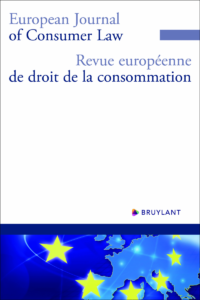 Consumers who logged into their Facebook account over the past weeks were surprised by a notice informing them that: “You need to make a choice to continue using Facebook. Laws are changing in your region, so we’re introducing a new choice about how we use your info for ads (…)”. Consumers subsequently had to choose between either using Facebook ‘for free’ but with personalised advertising. Or, paying for a monthly subscription without seeing ads when using Meta’s services. What had happened? In short: the European Court of Justice had decided (Case C-252/21, see in particular para 150) that Facebook needed consumers’ consent if it wanted to use their data for its advertising model. If consumers refuse to grant consent, Meta cannot use their data for advertising purposes.
Consumers who logged into their Facebook account over the past weeks were surprised by a notice informing them that: “You need to make a choice to continue using Facebook. Laws are changing in your region, so we’re introducing a new choice about how we use your info for ads (…)”. Consumers subsequently had to choose between either using Facebook ‘for free’ but with personalised advertising. Or, paying for a monthly subscription without seeing ads when using Meta’s services. What had happened? In short: the European Court of Justice had decided (Case C-252/21, see in particular para 150) that Facebook needed consumers’ consent if it wanted to use their data for its advertising model. If consumers refuse to grant consent, Meta cannot use their data for advertising purposes.
The notice by Facebook, however, immediately caught the attention of data and consumer protection associations and reflected tendencies and tensions in the regulation of the data economy that have been emerging over the past years. First, the tendency of data and consumer protection law to potentially complement each other in protecting consumer data. For example: does the notice by Facebook constitute an aggressive and misleading practice under the Unfair Commercial Practice Directive as it continues to advertise its services as ‘free’ – even though consumers grant access to their data in exchange? Second, is the ‘pay or consent’ model introduced by Facebook putting a price on consumer privacy which is ultimately enabled by consumer law which perceives data as ‘counter-performance’ (i.e. payment) in a contract?
Facebook’s notice thus reflected again why the interaction of consumer and data protection in their approach to the regulation of the data economy is a particularly interesting field of research. Whereas both have the potential of complementing each other in their objective of protecting consumer data, both might potentially contradict each other, in particular, when consumer law facilitates the commodification of personal data which stands in stark contradiction to the fundamental rights rational of European Data Protection Law.
This tension constitutes a main research focus of ESR Onntje Hinrichs. In his recent paper on “Consumer Law as Second Vantage Point for the Protection of Consumer Data – Protecting or Polluting the Privacy Ecosystem?” he precisely analyses how both fields of law might complement as well as contradict each other in the regulation of the data economy. His paper has been published in the and is available on the Journals Website. An abstract of his article is published below:
Creating a coherent regulatory framework for the European data economy constitutes a daunting task when data regulation increasingly touches on different fields of law. Whilst the regulation of data is anchored in European data protection law, it is turning into a key concern for European consumer law. Since individuals who consume goods and services in the digital economy are typically “consumers” and “data subjects” at the same time, authors and policy-makers have identified complementarities between both policy areas over the past decade. Building on these discussions, this article offers a new perspective on how both fields of law interact in their approach to the regulation of consumer data. By drawing parallels with debates that surrounded the uneasy relationship between consumer and environmental policy, it shows how the regulation of consumer data under consumer law not only contributes to the protection but also the pollution of the privacy ecosystem. At the same time, this analogy is used to showcase how existing tensions between both policy areas can be overcome.



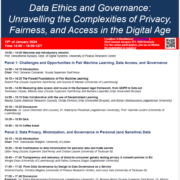


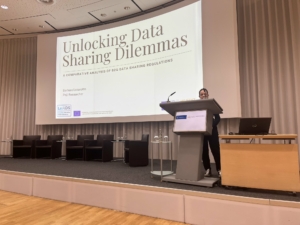 Barbara presented her research titled “Unlocking Data Sharing Dilemmas: A Comparative Analysis of Business-to-Government Data Sharing Laws and the European Data Act Proposal”, a presentation that aimed to explore the delicate balance between sharing and accessing privately held data by governments and the data monopolies held by big tech companies.
Barbara presented her research titled “Unlocking Data Sharing Dilemmas: A Comparative Analysis of Business-to-Government Data Sharing Laws and the European Data Act Proposal”, a presentation that aimed to explore the delicate balance between sharing and accessing privately held data by governments and the data monopolies held by big tech companies.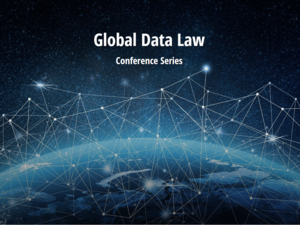 Barbara’s presentation also delved into the potential advantages of redistributing data value to society. She emphasized the opportunity to challenge the status quo and break down data monopolies, creating a more equitable system where the benefits derived from privately held data are shared with the broader community. This exploration was identified as crucial for policymakers seeking to strike a balance between fostering innovation and protecting individual privacy.
Barbara’s presentation also delved into the potential advantages of redistributing data value to society. She emphasized the opportunity to challenge the status quo and break down data monopolies, creating a more equitable system where the benefits derived from privately held data are shared with the broader community. This exploration was identified as crucial for policymakers seeking to strike a balance between fostering innovation and protecting individual privacy.
 enforcing rules against anti-competitive agreements among undertakings, abuses of dominant positions, and concentrations that have anti-competitive effects.
enforcing rules against anti-competitive agreements among undertakings, abuses of dominant positions, and concentrations that have anti-competitive effects. monitoring the application of the GDPR.
monitoring the application of the GDPR.
 Tellu is an SME experiencing significant growth since 2017, going from 5 employees in 2017 currently being 17 employees expecting to be 25 employees end of 2020. Tellu main offering includes TelluCloud an eHealth and welfare integration platform for connectivity, device management, edge computing, data gathering, data processing, and presentation as well as SaaS solutions for remote patient monitoring, video based supervision, and Personnel safety. The platform offers complete management and trustworthy execution and processing across the IoT, edge, and cloud space.
Tellu is an SME experiencing significant growth since 2017, going from 5 employees in 2017 currently being 17 employees expecting to be 25 employees end of 2020. Tellu main offering includes TelluCloud an eHealth and welfare integration platform for connectivity, device management, edge computing, data gathering, data processing, and presentation as well as SaaS solutions for remote patient monitoring, video based supervision, and Personnel safety. The platform offers complete management and trustworthy execution and processing across the IoT, edge, and cloud space.
 ΒΥΤΕ COMPUTER S.A. is a Greek Information Technology and Communications (ICT) Integrator company with a dynamic presence of over 30 years in the Greek ICT Market and a focus on the private sector. BYTE has 3 business segments: 1) systems Integration, 2) custom software application development, and 3) value-added services, including consulting, project management, and training services.
ΒΥΤΕ COMPUTER S.A. is a Greek Information Technology and Communications (ICT) Integrator company with a dynamic presence of over 30 years in the Greek ICT Market and a focus on the private sector. BYTE has 3 business segments: 1) systems Integration, 2) custom software application development, and 3) value-added services, including consulting, project management, and training services. MMI is a Pisa-based company whose mission is to enable surgeons around the world to address unmet needs and achieve better outcomes for microsurgical procedures. MMI offers an innovative robotic platform that’s mobile, easy to set up, compatible with existing surgical microscopes, and has a small footprint.
MMI is a Pisa-based company whose mission is to enable surgeons around the world to address unmet needs and achieve better outcomes for microsurgical procedures. MMI offers an innovative robotic platform that’s mobile, easy to set up, compatible with existing surgical microscopes, and has a small footprint.

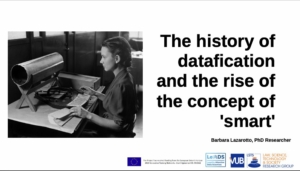
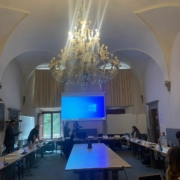
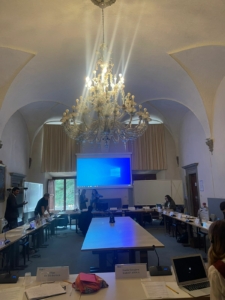 The roundtable was a lively and informative discussion on the challenges and opportunities of using AI in the public sector. We discussed the importance of ensuring that AI systems are used in a way that respects fundamental rights, such as privacy, non-discrimination, and freedom of expression. We also discussed the need for robust impact assessment processes to identify and mitigate the potential risks of AI systems.
The roundtable was a lively and informative discussion on the challenges and opportunities of using AI in the public sector. We discussed the importance of ensuring that AI systems are used in a way that respects fundamental rights, such as privacy, non-discrimination, and freedom of expression. We also discussed the need for robust impact assessment processes to identify and mitigate the potential risks of AI systems.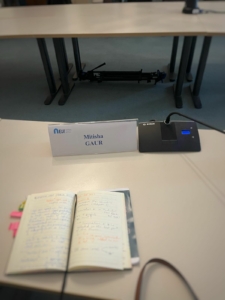
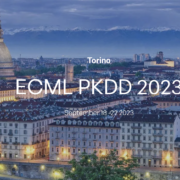
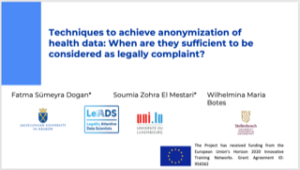 In the workshop, ESRs Fatma S. Doğan and Soumia El Mestari presented their paper titled: “Techniques to achieve anonymization of health data: When are they sufficient to be considered as legally compliant?” in which they have worked together with Dr Wilhelmina Maria Botes. In the study, they discussed the European Health Data Space(EHDS) and how it relates to using health data while aiming to keep it anonymized for secondary use purposes. They analyzed that the current stage of the EHDS proposal omits important points in terms of the operation of the secondary use framework. Further, they explored that achieving anonymization of various types of health data poses different challenging points in terms of technicality.
In the workshop, ESRs Fatma S. Doğan and Soumia El Mestari presented their paper titled: “Techniques to achieve anonymization of health data: When are they sufficient to be considered as legally compliant?” in which they have worked together with Dr Wilhelmina Maria Botes. In the study, they discussed the European Health Data Space(EHDS) and how it relates to using health data while aiming to keep it anonymized for secondary use purposes. They analyzed that the current stage of the EHDS proposal omits important points in terms of the operation of the secondary use framework. Further, they explored that achieving anonymization of various types of health data poses different challenging points in terms of technicality. 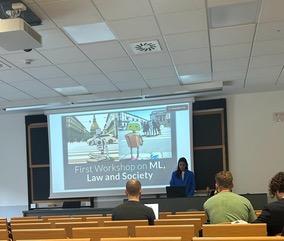 She remarks that environmental effects, mining rare earth minerals, and immense human labor which has been used in order to develop AI technologies are often omitted. She resembles generative AI to magic since we don’t know the cost of building it as a result of big tech companies not being transparent. To improve this field, she suggests that we should re-think the training process along with fair working conditions. Also, more research on sustainable generative AI should take place, and openness in research should be increased since we are suffering from a lack of transparency. In a way, she shed light on shadowed parts of developing AI technologies and stated that if we know the true cost of AI technologies then we could be more conscious about what we want and what we don’t want, and our needs. Lastly, she mentioned her book named, Atlas of AI in which she explored deeply what she discussed.
She remarks that environmental effects, mining rare earth minerals, and immense human labor which has been used in order to develop AI technologies are often omitted. She resembles generative AI to magic since we don’t know the cost of building it as a result of big tech companies not being transparent. To improve this field, she suggests that we should re-think the training process along with fair working conditions. Also, more research on sustainable generative AI should take place, and openness in research should be increased since we are suffering from a lack of transparency. In a way, she shed light on shadowed parts of developing AI technologies and stated that if we know the true cost of AI technologies then we could be more conscious about what we want and what we don’t want, and our needs. Lastly, she mentioned her book named, Atlas of AI in which she explored deeply what she discussed.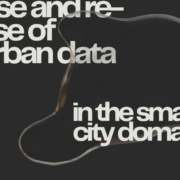
 ESR Barbara Lazarotto has contributed to a white paper on the “Use and re-use of urban data in the smart city domain”.
ESR Barbara Lazarotto has contributed to a white paper on the “Use and re-use of urban data in the smart city domain”.